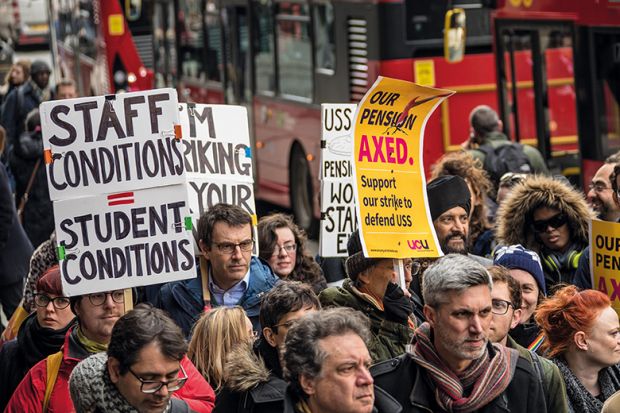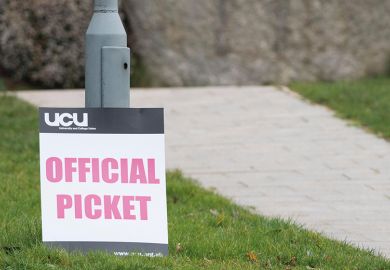HEPI hasn’t written about the Universities Superannuation Scheme (USS) before, despite the high-profile strike that affected many universities – and their students – last year.
We haven’t done so, in part, because there has already been so much discussion of the issue and we weren’t convinced we could add much value.
I was often tempted to add my tuppence worth because, before working in higher education, I spent almost a decade working in the pensions field. But I still felt there were more pressing areas where we could contribute.
We’re changing our stance this week with the launch of one of our most detailed papers ever, The USS: How did it come to this?
Why has our position changed? There is one major reason: the discussion to date has become bogged down in – admittedly very important – technical discussions over how to value the USS.
The bigger picture has been lost. The role of a think tank is to broaden debate when it happens and our new paper tries to do this by one route in particular: considering history. An influential education commentator recently tweeted, “I will reiterate for the millionth time that I am glad that some people like studying history because it is important. It’s just not as important as historians insist it is.” If our paper has an overarching mission, it is to disprove that argument.
Understanding why the USS looks as it does, and why change has been so painful, is impossible without an understanding of at least four decades of history, since the scheme was founded on April Fool’s Day 1975.
For example, the origins of the scheme explain its unusual governance arrangements, with considerable power lying in the hands of Universities UK and the University and College Union, even though only around half of the UUK members have deep interests in the USS and many UCU members never get the chance to join it (because they work in parts of the sector not covered by the scheme).
The origins of the USS also explain the way it has rewarded baby boomers. An academic born in 1950 might have been settling down in their career just as the USS was launched. They might have retired aged 65 in 2015 with a generous pension, just a year before the first major reductions to pension entitlement for existing staff.
Our paper has various secondary objectives too. Chief among them is to show how, over time, both the union and employers have sought hard to ensure generous pensions for academic staff. Poor pensions mean lower quality staff, higher staff turnover and low morale. No one wins, though in the midst of any major industrial dispute and in the divisive times in which we live, it can be easy to forget your opponents may be well intentioned too.
In the past, any pension tensions between the two sides were masked by various things, including the dominant concept of a single higher education funded by taxpayers rather than fees (which meant extra costs landed off campus), high investment returns and lax pensions regulation.
Over time, the main union involved in pension negotiations (originally the AUT and now the UCU) has been remarkably prescient, calling for practices that once seemed excessively generous – such protecting pensions in payment from the ravages of inflation – that would later enjoy statutory force.
Many people were surprised when the press seemed quite sympathetic to the UCU line during the 2018 strike, but a dispassionate observer might well conclude that current staff members were being asked to take too much pain for too little (no?) gain. This is true even though some of the union’s positioning seems illogical. For example, if they are so confident about returns and less worried about risks than the employer side, why are they so sceptical of defined contribution pensions, which put the risks and rewards on members?
Comparative historical assessment also shows, however, that universities have altered their pension entitlement less than others, meaning their staff have been left with much more generous and expensive pensions than other private sector employees, including people working in the charitable sector, which – given most universities’ legal status – is perhaps the best comparator.
Since the first proper university pension scheme began a century ago, employers’ pension contributions have increased by 260 per cent while employees’ have grown by just 60 per cent. No responsible university would leave the generosity of the USS in place without their senior staff at least asking serious questions about its viability in these challenging and febrile times, especially when The Pensions Regulator calls some of the shots.
So our report tries to explain the story of the USS from its origins to the present day. It has grown like Topsy to become the biggest pension fund in the UK. But the paper leaves the alphabetti spaghetti of other pension arrangements in the sector (such as the TPS, the LGPS and universities’ own schemes, such as SAUL) for another day. It does include, however, lessons on how to drive through successful pensions reform as opposed to unsuccessful pensions reform.
Having spent the past few months delving into the subject, I am left with three thoughts above all. First, pay and pension negotiations need to come closer together in higher education. Secondly, for the USS dispute to end – it is currently on pause – both sides need to give as well as to take. Thirdly, if defined benefit provision is to continue, it makes little sense to put such a wide range of employers of such different sizes with such different covenants and boasting such different appetites to risk in the same basket.
Nick Hillman is director of the Higher Education Policy Institute.
Register to continue
Why register?
- Registration is free and only takes a moment
- Once registered, you can read 3 articles a month
- Sign up for our newsletter
Subscribe
Or subscribe for unlimited access to:
- Unlimited access to news, views, insights & reviews
- Digital editions
- Digital access to THE’s university and college rankings analysis
Already registered or a current subscriber?








